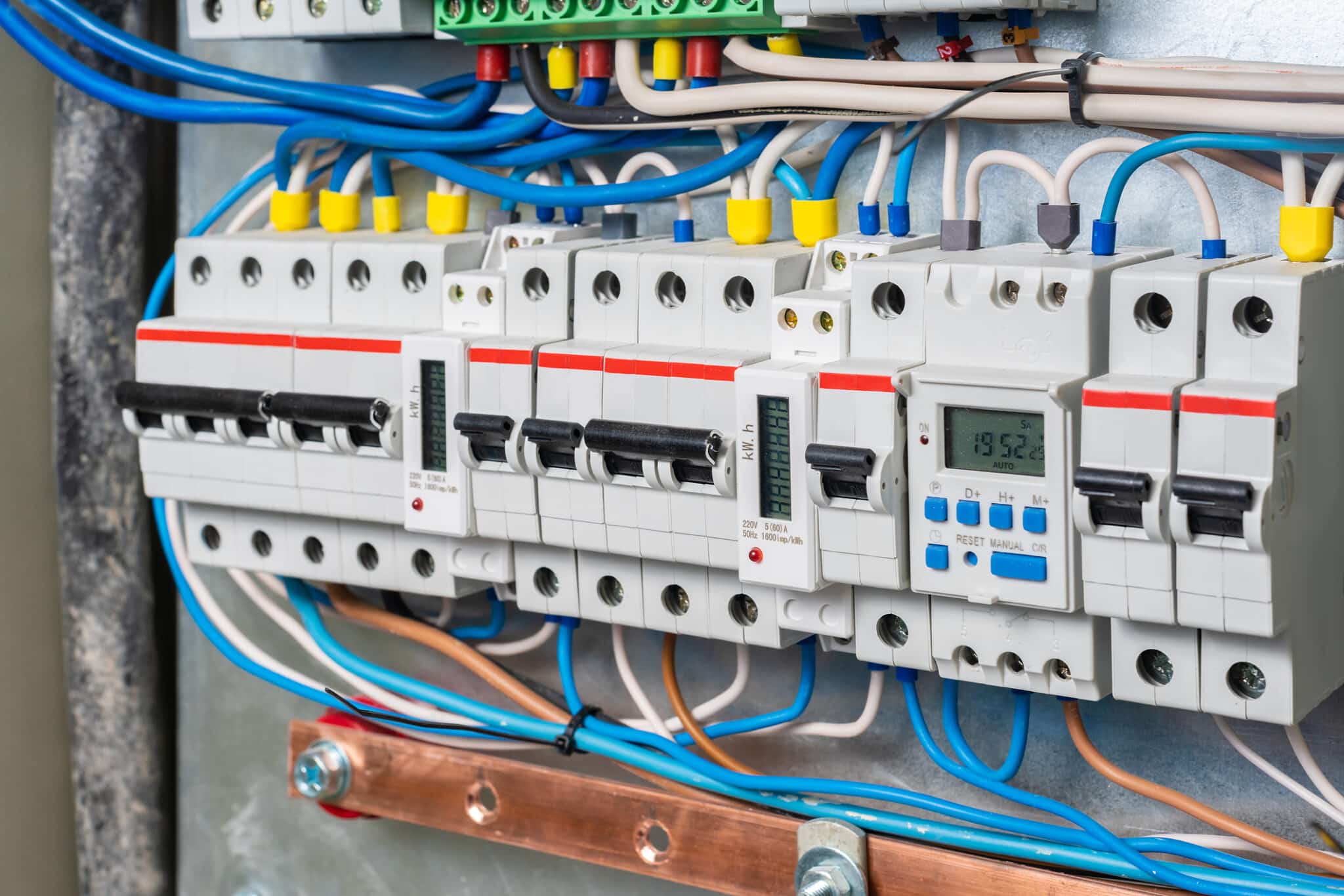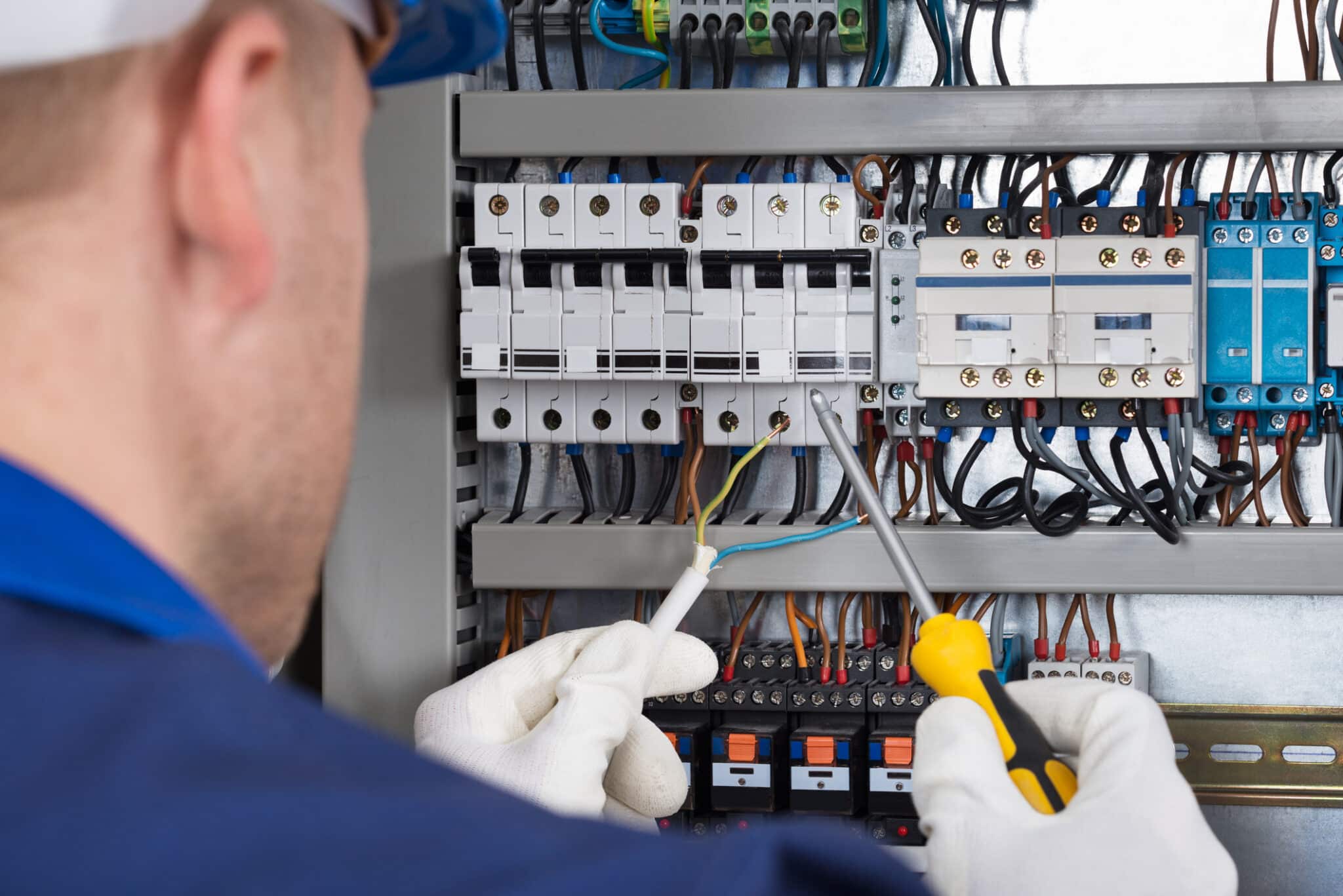As the temperature starts to drop, is your fuse box prepared to handle the change? Many homeowners in Lancaster, PA, York, PA, and Harrisburg, PA don’t realize that the cooler months can actually put extra strain on their electrical systems.
Increased heating, more plugged-in devices, and holiday lights can all add up! If your fuse box isn’t up to the task, it could lead to flickering lights, frequent power trips, or worse. Let’s make sure your home is safe and cozy this winter by giving your fuse box a little attention.

Understanding Your Fuse Box
Your fuse box serves as the main hub of your home’s electrical system, directing power to every room and appliance. When circuits become overloaded, it acts as a safety mechanism by “blowing” a fuse or “tripping” a breaker to prevent overheating and potential fires.
Key components include the main switch, which controls the flow of electricity to your entire home, and circuit breakers or fuses that manage individual circuits.
Additionally, many modern panels have an RCD (Residual Current Device), a specialized safety switch that protects against electrical shocks. Understanding these parts can help you identify early signs of trouble and keep your home’s electrical system running smoothly.
Why Cooler Weather Affects Your Fuse Box
As temperatures drop, homeowners in areas like Lancaster, PA, York, PA, and Harrisburg, PA typically use more electricity to keep their homes warm and cozy.
This sudden increase in demand can put extra stress on your fuse box, especially if it’s outdated or hasn’t been maintained properly.
More power flowing through your circuits means there’s a higher risk of fuses blowing or circuit breakers tripping. Let’s take a closer look at why winter weather can cause these issues and what you should watch out for.
Increased Electrical Demand in Winter
When the weather turns chilly, it’s common to use more electric devices and heating systems. Space heaters, electric blankets, and extra lighting are just a few examples of how winter can ramp up electricity usage.
Add in holiday decorations, and your electrical system may start feeling the pressure. Each of these items draws power from your fuse box, which has to work harder to meet the demand.
If your home has older wiring or your fuse box isn’t in great shape, this increased load could lead to blown fuses or tripped breakers, disrupting your daily activities.
Risks of Overloading Circuits
Overloading circuits is one of the most common winter-related fuse box problems. It happens when too many high-power devices are plugged into a single circuit, drawing more electricity than it can handle.
This not only causes inconvenience but can also be dangerous, as it increases the risk of electrical fires. Signs of an overloaded circuit include buzzing sounds from outlets, a burning smell, or outlets that feel warm to the touch.
If you notice any of these warning signs, it’s crucial to address them right away. Taking steps to reduce the load on your circuits can prevent costly damage to your electrical system.
Signs Your Fuse Box Needs Attention
It’s not always easy to tell when your fuse box is having issues, but there are a few warning signs you should never ignore.
Catching these signs early can prevent bigger electrical problems down the road and help keep your home safe. From flickering lights to frequently tripped breakers, here’s what to watch for as the temperatures drop.
If you notice any of these signs, it might be time to take a closer look at your fuse box or call in a professional for an inspection.
Frequent Tripping of Circuit Breakers
This is a sign that your fuse box might be overloaded or there could be a fault in your electrical wiring. When a breaker trips repeatedly, it’s usually because the circuit is drawing more power than it can safely handle.
While flipping the switch back on may seem like a quick fix, it’s only a temporary solution. Constantly resetting your breakers can wear them out and potentially cause more serious electrical issues. If this happens frequently, it’s best to figure out what’s causing the problem and make adjustments before it becomes a safety hazard.
Flickering Lights
If your lights are flickering on and off, it’s more than just a spooky coincidence. Flickering lights often point to a loose connection, an overloaded circuit, or a failing fuse box. This issue is especially common in older homes that have outdated electrical systems.
While one flickering light could be due to a faulty bulb, if multiple lights are doing it, that’s a red flag that something’s wrong with your wiring or fuse box. Ignoring this sign can lead to more severe issues, such as damaged wiring or even electrical fires, so it’s best to address it sooner rather than later.
Burnt Fuses or Discoloration
Burnt fuses or melted insulation are indicators of overheating, which can be extremely dangerous. Discoloration around the box or a burning smell might also suggest that the wiring is faulty or that a particular circuit is drawing too much power.
Never ignore these signs, as they could lead to serious safety risks. If you see any burnt fuses or smell something unusual, turn off the power and contact an electrician right away.
Preparing Your Fuse Box for Cooler Weather
Taking a few simple steps to prepare your electrical panel before the cold weather hits can save you from dealing with unexpected issues later. By inspecting and maintaining it now, you’ll be able to keep your home warm, cozy, and safe all season long.
Even if you’re not an expert, there are basic things you can do to make sure everything is running smoothly. Whether you’re getting ready for a harsh winter in Lancaster, PA, or just want to be proactive, here’s how to prep your electrical system for cooler weather.
Inspecting the Electrical Panel
One of the easiest things you can do is give your panel a quick visual inspection. First, turn off the power to stay safe. Then, open the panel door and look for any obvious signs of trouble, like frayed wires, loose connections, or burnt circuits.
Check that all the fuses or breakers are in good condition and that none show signs of wear or damage. If you notice anything unusual, like dark spots or a burning smell, it’s best to call a professional for a closer look. A little effort now can prevent bigger issues during the colder months.
Cleaning the Area Around the Panel
Keeping the area around your electrical panel clean and clear is just as important as inspecting the inside. Make sure there are no clutter or flammable materials like paper or cleaning supplies stored nearby, as these could pose a fire hazard if the panel overheats.
Dust and dirt can also build up inside, which might cause connections to loosen or circuits to short out. Wipe down the outside with a dry cloth, and ensure there’s easy access to it in case you need to reach it quickly during an emergency. A clean, accessible electrical panel is a safer one.
Upgrading Your Fuse Box
If your home is still using an older fuse panel, it might be time to think about an upgrade. An outdated box may struggle to keep up with the higher demand that often comes with colder weather, especially if you’re running multiple heating devices or holiday lights.
Upgrading to a modern circuit breaker panel can provide better safety and efficiency for your home. It’s an investment that not only protects your property but also adds value. Let’s take a closer look at when to consider an upgrade and the benefits it brings.
When to Consider an Upgrade
Knowing when to upgrade isn’t always easy. However, there are a few clear signs that it’s time to make the switch. If your panel is over 25 years old, has visible signs of wear, or you constantly deal with tripped breakers, it’s likely due for a replacement.
Homes with frequent electrical issues, like flickering lights or burnt fuses, are also good candidates for an upgrade. In some cases, adding new appliances or home additions can push your old panel beyond its limits, making an upgrade necessary to handle the increased load safely. If any of these sound familiar, it might be worth having a professional take a look.
Benefits of a Modern Fuse Box
A newer panel offers a lot more than just peace of mind. First, it can handle higher electrical loads, which means fewer blown fuses or tripped breakers, even when you’re using high-powered devices.
Modern panels also come equipped with advanced safety features like arc fault and ground fault protection, which help prevent electrical fires and shocks. Additionally, a new installation can increase your home’s value and make it easier to sell in the future.
Finally, you’ll have more flexibility to add new circuits if you plan to expand or remodel your home. Overall, upgrading provides improved safety, reliability, and convenience.
Safety Tips for Working with Electrical Panels
Working around your home’s electrical panel can feel intimidating, especially if you’re not experienced with electrical systems. While some maintenance tasks are safe to handle on your own, others are better left to the pros.
Taking the right safety precautions is key to avoiding accidents and ensuring the job gets done properly. Whether you’re doing a basic check-up or replacing a fuse, these safety tips will help keep you safe when working around your panel.
Always Turn Off the Power First
This might sound obvious, but it’s worth repeating: always turn off the power before you do anything around the panel. To safely shut off power, flip the main switch to the “off” position.
This cuts off electricity to your entire home, ensuring that you won’t accidentally shock yourself while inspecting or replacing a fuse.
If you’re only working on one circuit, turn off just that specific breaker. Even with the power off, still treat every wire as if it could be live, and use tools with insulated handles to avoid accidents.
Use Proper Tools
Using the right tools is crucial when working on an electrical panel. Avoid using metal tools that could conduct electricity, and opt for insulated tools instead. Basic items like a voltage tester can help confirm whether a circuit is still live, while a flashlight makes it easier to see what you’re doing in low light.
If you’re replacing fuses, make sure you use the correct type and rating for your panel. Never try to force a fuse into place—this can damage the panel and create a safety hazard. Having the right tools on hand makes the job quicker and safer.

Professional Help vs. DIY
When it comes to managing your home’s electrical systems, especially the fuse box, the complexity and potential risks involved make it essential to rely on professional electricians rather than attempting DIY fixes.
Even minor electrical issues related to your fuse box can escalate into serious hazards if not handled correctly. For homeowners in Lancaster, PA, York, PA, and Harrisburg, PA, enlisting a professional electrician ensures that any electrical work, particularly on your fuse box, is performed safely and correctly, providing peace of mind.
When to Call an Electrician
Professional intervention is crucial in many situations. If you encounter frequent tripping breakers, burnt fuses, or any signs of overheating in your fuse box, it’s imperative to consult an expert.
Electrical panel upgrades, new circuits, or any noticeable scorch marks and buzzing sounds from your panel are clear indicators that professional services are needed. Electricians are equipped with the necessary tools and expertise to safely diagnose and resolve electrical issues, preventing potential hazards.
The Risk of DIY Electrical Work
Handling electrical work without adequate knowledge and tools can lead to severe consequences. Simple tasks such as tightening loose connections or testing circuit breakers might seem manageable, but they can inadvertently overlook underlying problems that could lead to bigger issues.
Therefore, it’s always recommended to defer to the expertise of licensed electricians who can ensure that all aspects of your electrical system, particularly the fuse box, are functioning safely and efficiently. Remember, what might appear as a minor issue could be a symptom of a larger problem, so professional assessment is key.
By prioritizing professional electrical services, homeowners can avoid the pitfalls of DIY electrical work, ensuring their home’s electrical system operates optimally and safely.
If you’re unsure about any aspect of your electrical system, don’t hesitate to reach out to a professional electrician. They provide the expertise and peace of mind necessary to maintain a safe and reliable electrical infrastructure in your home.
Ready to Upgrade or Repair Your Electrical Panel Before Winter Hits?
Don’t wait until a small issue with your fuse box turns into a major problem! If you’re in Lancaster, PA, York, PA, or Harrisburg, PA, the team at Mister Sparky of Lancaster is here to help.
Our professional electricians specialize in everything from fuse box inspections to full upgrades, ensuring your home stays safe and powered during the colder months. Give us a call today and get your fuse box winter-ready!
Fuse Box FAQs
How often should I check my Fuse Box?
It’s a good idea to check your fuse box at least once a year, especially before the cooler months set in. Look for signs of wear, such as loose connections, burnt fuses, or discolored wiring. Regular inspections can help catch small issues early on, preventing bigger, more expensive problems down the line.
What should I do if a fuse keeps blowing?
If a fuse blows repeatedly, it’s a sign that a circuit is overloaded or there’s a fault somewhere. Start by unplugging devices from that circuit and see if the issue continues. If it does, it’s best to contact an electrician to inspect the wiring and panel for any underlying problems.
Can I replace a fuse myself?
Yes, replacing a fuse is one of the few tasks you can safely do yourself—if you follow proper precautions. Make sure to switch off the main power, and only use a new fuse of the exact same rating. However, if you’re unsure or uncomfortable, it’s better to have a professional handle it.
Why do my lights flicker when I use certain appliances?
Flickering lights usually indicate that a circuit is under stress or there’s a loose connection somewhere in the wiring. This can happen when high-demand devices, like space heaters, are plugged in. If the flickering continues even after unplugging, it could be a sign of a bigger issue that needs to be inspected by a professional.
What’s the difference between a fuse panel and a modern breaker box?
A fuse panel uses replaceable fuses to protect each circuit, while a breaker box uses switch-like breakers that can be easily reset. Breaker boxes are generally safer and more reliable, as they can handle higher electrical loads and come with added safety features. Upgrading to a breaker box is recommended if your current system is outdated.






